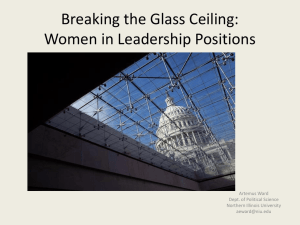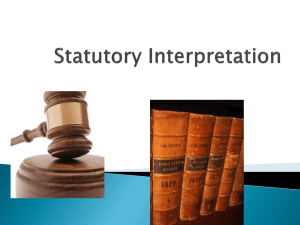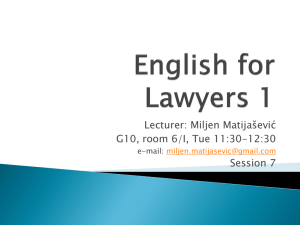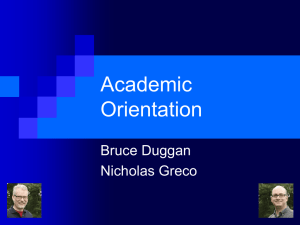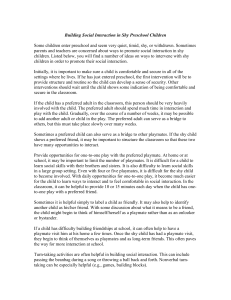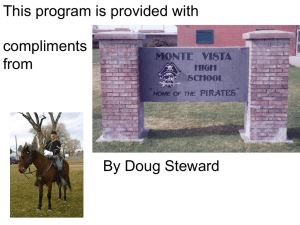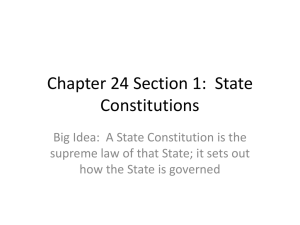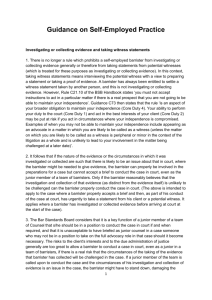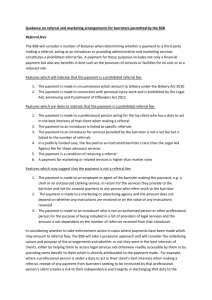Congratulate Mr Junior on a fine speech etc
advertisement
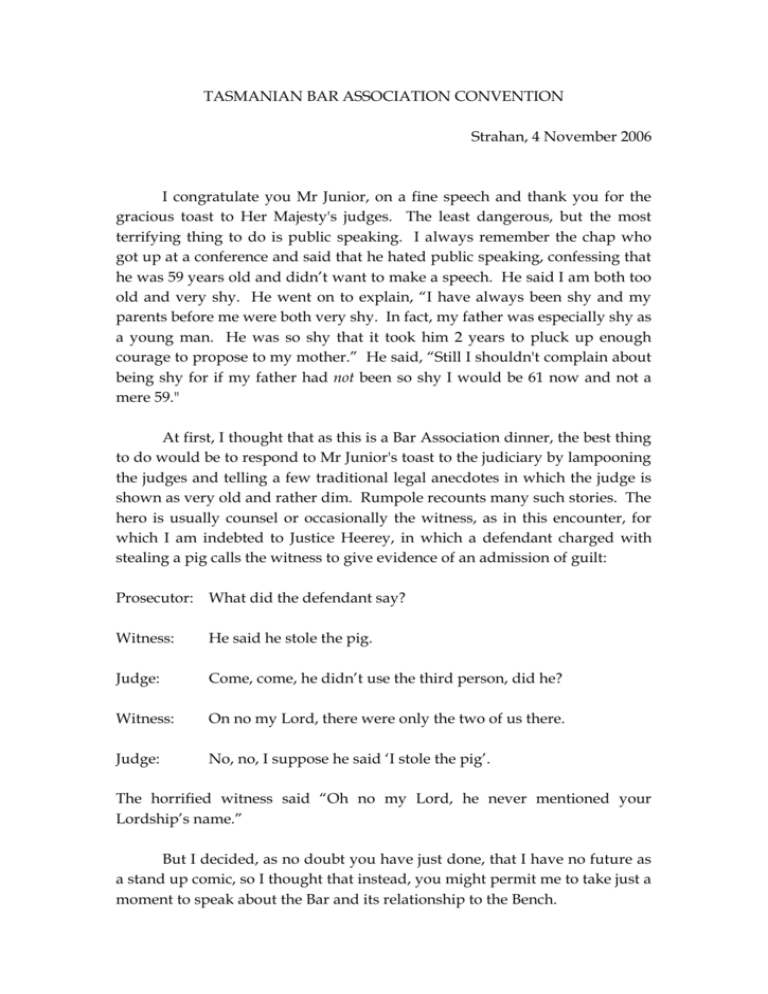
TASMANIAN BAR ASSOCIATION CONVENTION Strahan, 4 November 2006 I congratulate you Mr Junior, on a fine speech and thank you for the gracious toast to Her Majesty's judges. The least dangerous, but the most terrifying thing to do is public speaking. I always remember the chap who got up at a conference and said that he hated public speaking, confessing that he was 59 years old and didn’t want to make a speech. He said I am both too old and very shy. He went on to explain, “I have always been shy and my parents before me were both very shy. In fact, my father was especially shy as a young man. He was so shy that it took him 2 years to pluck up enough courage to propose to my mother.” He said, “Still I shouldn't complain about being shy for if my father had not been so shy I would be 61 now and not a mere 59." At first, I thought that as this is a Bar Association dinner, the best thing to do would be to respond to Mr Junior's toast to the judiciary by lampooning the judges and telling a few traditional legal anecdotes in which the judge is shown as very old and rather dim. Rumpole recounts many such stories. The hero is usually counsel or occasionally the witness, as in this encounter, for which I am indebted to Justice Heerey, in which a defendant charged with stealing a pig calls the witness to give evidence of an admission of guilt: Prosecutor: What did the defendant say? Witness: He said he stole the pig. Judge: Come, come, he didn’t use the third person, did he? Witness: On no my Lord, there were only the two of us there. Judge: No, no, I suppose he said ‘I stole the pig’. The horrified witness said “Oh no my Lord, he never mentioned your Lordship’s name.” But I decided, as no doubt you have just done, that I have no future as a stand up comic, so I thought that instead, you might permit me to take just a moment to speak about the Bar and its relationship to the Bench. 2 Although the Tasmanian Bar Association is a relatively new organisation, I like to think that to-night's dinner has its origins in 15th century England, for there are accounts in the Black Books of Lincoln's Inn 1 of Bar dinners that took place as long ago as 1450 – no doubt with a menu slightly different from the one we have tonight! In those days pupils-at-law regularly sat down at formal dinners with their Sergeants and the judges. The students' education was a kind of informal apprenticeship. There were no Universities and no Boards of Legal Education. Members of the Inns, not the judges gained the unique right to admit pupils to practice in the Courts. According to the history books, at the Inns of Court the students learned not only the law, but also history, scripture, music and dancing and "other nobleman's past times, as did those who are brought up in the King's house."2 The Inns became powerful fraternal organisations that developed and maintained traditions and values that have endured over the centuries. Those values and traditions came to Tasmania with the early settlors. However, the concept of a separate Bar, which developed in the colony of New South Wales, did not translate to Van Dieman's Land. The first Court on this island, the Lieutenant Governor's Court,3 admitted to practice people who had no legal training at all. After the Charter of Justice4 the Supreme Court admitted practitioners from England, but reserved the right to admit unqualified lawyers in case there were not sufficient qualified people.5 The first Roll of the Court recognised the distinction between barristers and solicitors, but the distinction soon disappeared. There was an early statute that made provision for a separate Bar, but that was soon repealed and the profession has since remained a fused one. It is only in recent times that we have seen the development of a separate Bar of legal practitioners who have chosen to practice solely as barristers. Today, membership of this association is not confined to those who elect to practise only as barristers. It includes those whose work is wholly or substantially litigious, whether as a solicitor or as a barrister. So then, what what’s the relevance of all this history? What has tonight’s dinner got to do with those pupils, Sergeants and judges who dined 1 "History of English Law" W S Holdsworth Vol ll 499. 2 Supra at 494. 3 Letters Patent 4 February 1814. 4 1831. 5 "History and Status of the Legal Profession." Sir Peter Crisp 1967. 3 at the Inns of Court a few centuries ago? After all, this Association does not do history, scripture or music and although sometimes, dancing has been seen, the Tasmanian Bar Association certainly does not encourage "nobleman's past times" - whatever that might mean. The relevance, I suggest, is that this Association maintains and supports those great values and principles that have been developed over the centuries by the Inns of Court; traditional values and principles that govern the practice of those at the Bar; traditional values and principles that govern the relationship between Bench and Bar; traditional values without which the proper administration of justice and the rule of law would founder. I can do no better that read the words of the great Lord Denning, which you will note were spoken before there were many women practising at the Bar, but which of course, are applicable to all barristers and, in this State, litigious solicitors, regardless of gender: "… As an advocate a barrister is a minister of justice equally with the judge. He has a monopoly of audience in the higher courts. No one save he can address the judge, unless it be a litigant in person. This carries with it a corresponding responsibility. A barrister cannot pick or choose his clients. He is bound to accept a brief for any man who comes before the courts. No matter how great a rascal the man may be. No matter how given to complaining. No matter how undeserving or unpopular his cause. The barrister must defend him to the end. Provided only that he is paid a proper fee he must accept the brief and do all he honourably can on behalf of his client. I say 'all he honourably can' because his duty is not only to his client. He has a duty to the court which is paramount. It is a mistake to suppose that he is the mouthpiece of his client to say what he wants: or his tool to do what he directs. He is none of these things. He owes allegiance to a higher cause. It is the cause of truth and justice. He must not consciously misstate the facts. He must not knowingly conceal the truth. He must not unjustly make a charge of fraud, that is, without evidence to support it. He must produce all the relevant authorities, even those that are against him. He must see that his client discloses, if ordered, the relevant documents, even those that are fatal to his case. He must disregard the most specific instructions of his client, if they conflict with his duty to the court. The code which requires a barrister to do all this is not a code of law. It is a code of honour. If he breaks it, he is offending against the rules of the profession and is subject to its discipline …".6 6 Rondel v Worsley (1966) 3 WLR 950. 4 I do not wish to detain you any longer. I just thought that that in these days of case management, time costing, mergers and other pressures of daily practice, a Bar dinner in the recesses of Strahan was an appropriate occasion to recall these principles. For those of you who think that this is all irrelevant history let me draw your attention to the alleged events at Clayton Utz that surfaced in the Age newspaper only last week. It was reported that an internal investigation had revealed that two of the senior partners, now former senior partners in Clayton Utz, had been guilty professional misconduct involving the destruction of documents in the course of litigation in which the firm acted for defendant, British American Tobacco. Whether the report is correct or not, I of course do not know, but the Editorial for last Sunday said this: “It is a fundamental principle of out legal system that lawyers owe their first duty to the courts. Justice cannot be served if lawyers mislead the courts or allow their clients to mislead the courts.” So the principles, of which Lord Denning spoke, born in the Inns of Court, are just as important in Australia today as they were hundreds of years ago. They must endure for hundreds more years, and in this State, Mr Junior, that is up to the Judges whom you toasted this evening and all of you, the Tasmanian Bar Association.

